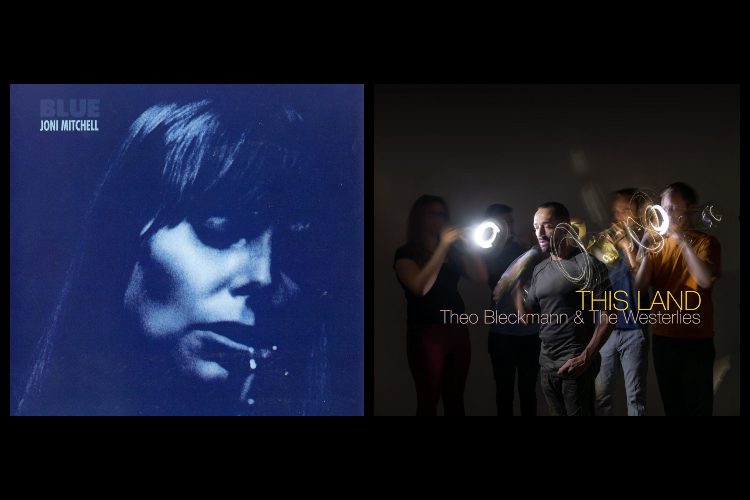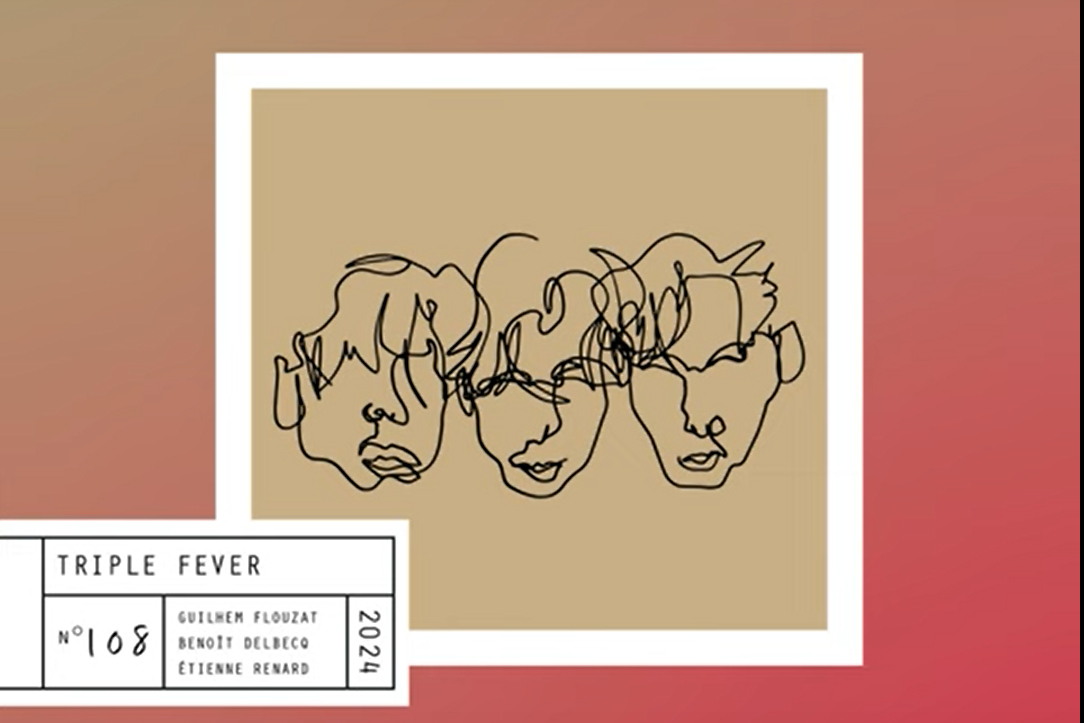Reflections Through Geography with Joni Mitchell and Theo Bleckmann and The Westerlies
|
Getting your Trinity Audio player ready...
|
Fifty years ago, Joni Mitchell released the most iconic album of her career, one that changed the trajectory of music forever: Blue (Reprise, 1971). Writing uniquely warm, evocative lyrics and integrating folk guitar, piano, and dulcimer with adventurous harmony, Blue was widely successful upon its release and continues to influence new works today. However, part of its excellence derives from something rarely discussed: its deep lyrical reflection on themes of place. As a Canadian living in Los Angeles, a foreign city Mitchell viewed ambiguously, she cynically compares the dry climate of Southern California to personal stagnation and despair. She longs to leave even as she sings of traveling abroad and missing the people of Los Angeles. She seeks a world without “streets… full of strangers” and wishes to be home with those she loves. The album reflects the contradiction this duality brings: falling in love and falling out of love, mourning and dancing in joy, traveling and coming home—twin aspects of life. On Blue, Mitchell brings things we all live through into sharper focus via geography, illuminating the universal. From a contemporary perspective, it seems unsurprising that the record would achieve the following it did when it came out and that it would retain its popularity. This includes influencing countless works since, among them Theo Bleckmann and The Westerlies’ This Land (Westerlies Records, 2021).
Despite its appeal, Blue also relates distinctively to Mitchell’s own experience as an ex-pat in the United States and an activist. Not merely a treatise on love and life, Mitchell also frequently argues points linked to the social issues of the day. Of course, looking beyond Blue into her wider discography, Mitchell shows a proclivity for protest music. Her most widely known song, “Big Yellow Taxi,” is a protest song. “Woodstock,” which has repeatedly charted with versions by various artists since its release, is one of the definitive songs about the ‘60s. Blue may not seem as openly political or protest-oriented as some of Mitchell’s other work, but it still is deeply linked to protest in more subtle ways—partially through geography. To Mitchell, California is not only her home. It is also the land of protest and progress. A place where rather than being “old and cold and settled in its ways,” the push for social change is vibrant, constantly moving forward, and invigorating. Whenever Mitchell writes about California, it appears partially linked to this ideal, accompanying her mixed views on the state. Is the counterculture movement “just a dream some of us had,” or is it still alive and meaningful? The album doesn’t give answers, but it lets the listener contemplate.
Ultimately, following the success of Blue, Mitchell continued to develop in enigmatic directions and kept asking these questions, further emphasizing the link between geography, emotion, protest, and music. Five years later, she released Hejira (Asylum, 1976), her jazz fusion magnum opus that stands alongside Blue as a cornerstone of her discography.
Recounting her exodus by car across the United States and Canada, the restless and wandering songs of Hejira are driven by thundering rhythm guitar and Jaco Pastorius’ characteristic melodic fretless bass. They tell dark tales of journeys across deserts, forests, and prairies as we encounter those who Mitchell contemplated on the journey, strange fantasy figures haunting desolate worlds on the border between myth and reality. Stories emerge through these meditations with friends and acquaintances representing archetypes in the tradition of North American art. They also expose Mitchell’s introspection while animals cross the empty skies as they stalk their prey and women like Amelia Earhart and Lady Liberty cast an inescapable shadow; Mitchell explores her view of both America and herself, journeying on a pilgrimage to discover her soul and the land under her feet.
“In search of love and music my whole life has been,” Mitchell wails on “Black Crow.” Constantly in pursuit, it’s clear she means it. She seeks something— music, meaning, a home, and a journey— richly connected to the land she passes through on her way. Hejira is about a place as much as it is about Mitchell herself: the geography of her journey and the meaning derived from it cannot be separated, especially regarding America, whose imagery is omnipresent in the album. As the United States endures a time of crisis, Mitchell’s meditations seem even more relevant today: how does the land we live on and pass through affect the way we live and think? What role does the American mythos play in our lives? How should we relate to it? How should we deal with issues in the world like urban decay, violence, or the restricting roles of gender, race, and class? Is the dream of love, of music, of Beale Street and of Laurel Canyon dead?
As we approach the milestone of Blue turning fifty, many works – in writing, art, and of course music – will emerge in the lineage of Joni Mitchell. However, one of the first albums of this year to build on the tradition of Mitchell’s work does more than simply emulate her musical elements. Instead, it delves rewardingly into a Mitchell-esque exploration of what it is to contemplate America today, capturing the geographic power which is so characteristic to Mitchell’s work. Innovative German singer Theo Bleckmann and American brass quintet The Westerlies’ collaborative album, This Land, provides a gripping artistic take on America, social justice, and immigration. It provides a contemporary perspective applied to Mitchell’s vision that may help us address her questions anew.
Although Bleckmann and The Westerlies are both based in New York, This Land was conceived in Putney, Vermont, in the heart of the place most often branded “American” in classical music; rural New England. That is not a coincidence. This Land reflects its thoughts on America through the details of its music, encapsulating the American tradition from classical music, folk, traditional protest songs, and modern vocal jazz. The album feels like a mixtape, fluctuating from the traditional and consonant (including bright, optimistic instrumental marches which appear between the darker numbers) to the modern and dissonant to reflect the musical and thematic landscape of the world and to jump through time, relating messages of the past to modern issues. This eclectic nature feels like a strength, though, not a weakness. It reminds us that historical concepts, like the power of labor organization and necessity of protest, still ring true.
This Land opens with a haunting solo vocal on “The Fiddle and the Drum,” a Joni Mitchell cover from her album Clouds (Reprise, 1969). The song takes the perspective of an immigrant in America and addresses the nation to ask why it must go to war and pleading the nation to remember “all the good things you are” with alternatives to violence and warmongering. In many ways, the song outlines the themes of the album: an immigrant questioning America’s contemporary struggles and whether there can be a return to stated ideals, topics Mitchell reflected on for much of her career.
Similarly, on the track, “Land,” lyrics by another immigrant, Agha Shahid Ali, discusses America and its struggles, casting America as a “promised land” but one in need of spiritual redemption to overcome its struggles with judgment and xenophobia. What gives this song, and several others on the album, power is its combination of elements of America’s culture, geography, political and social issues, and its music of great depth. Rarely does an album so effectively combine musical and lyrical elements; it truly feels like the two merge into one much deeper work. Bringing together musical and lyrical hallmarks of America makes the music not only political but profoundly emotional. A further illustration of this is found on “Another Holiday,” a moving ballad whose lyrics reflect aspects of the lived American experience that feel deeply personal and current —a family dinner during a holiday, football on TV, trying futilely to tune out the politics of today and focus on the people nearby. The song asks whether the separation of daily life from politics is even possible today, pulling between internal conflict and American sentimentality. While the song specifically focuses on the plight of the LGBTQ+ community, its meaning can apply in many different areas. It shows how what may seem like political issues are not solely matters of policy but deeply linked to our family structures, how we relate to each other, and indeed American identity itself.
While This Land echoes the voices of the past by casting itself in the mold of Mitchell, it is decisively modern and necessary today. The closing song “Thoughts and Prayers,” serves not as merely a reflection but as a call to action enticing all of us to “be the change we need to see” in working towards progress. Answering the questions proposed by Mitchell decades earlier, This Land has an ultimately rousing message: to get to work and create progress. Far from doomed, American activism holds great promise so long as we take action ourselves and further the decades-old dream. Though we may be in a time of crisis, we have the responsibility, obligation, and opportunity to better the country. This Land exposes some of America’s contradictions even as it encourages action to repair our nation. As Bleckmann sings, “the hour has come to redeem the pledge,” to embody in our actions American values and work for true social change.
This Land by Theo Bleckmann and the Westerlies is now available on Bandcamp.



